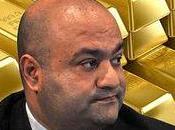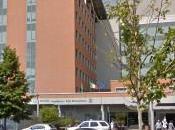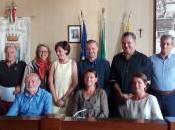In primo luogo abbiamo chiesto per quale motivo CL abbia il sostanziale monopolio della sanità lombarda: il dott. Bresciani ha rappresentato in un'intervista di diversi anni fa la convinzione che sia cosa giusta che i direttori generali siano nominati tenendo conto del responso delle urne, mettendo dunque in secondo piano il merito. Per questo motivo la sanità è stata spartita in tante delle sue cariche di assoluto rilievo a soggetti dal pensiero conforme a quello del presidente della regione Lombardia.
Un'altra domanda che abbiamo fatto riguarda la possibilità di coinvolgere persone fuori da qualsiasi appartenenza o gruppo, avvalendosi dunque di collaboratori non presenti in alcuna lista. Ambrosoli ha specificato che la sua lista civica è composta solo da persone che non hanno avuto incarichi di rappresentanza politica sotto alcun partito: non si tratta tuttavia di ostilità verso chi ha già svolto incarichi di questo tipo, ma di una volontà di differenziazione.
 Nel frattempo è stata lanciata sul web anche una piattaforma di partecipazione programmatica alla quale si sono iscritte in pochi giorni più di 500 persone che hanno partecipato alla discussione sui programmi. E' anche vero che nel momento in cui si chiede il parere dei cittadini, bisogna essere pronti ad accogliere le loro richieste, e questo richiede una partecipazione attenta, assidua, e molto impegno. In alcune circostanze le proposte non sono sostenibili dal punto di vista economico e finanziario, ma si sta lavorando per tradurre tali idee in qualche cosa che sia invece sostenibile, sia a livello economico che ambientale.
Nel frattempo è stata lanciata sul web anche una piattaforma di partecipazione programmatica alla quale si sono iscritte in pochi giorni più di 500 persone che hanno partecipato alla discussione sui programmi. E' anche vero che nel momento in cui si chiede il parere dei cittadini, bisogna essere pronti ad accogliere le loro richieste, e questo richiede una partecipazione attenta, assidua, e molto impegno. In alcune circostanze le proposte non sono sostenibili dal punto di vista economico e finanziario, ma si sta lavorando per tradurre tali idee in qualche cosa che sia invece sostenibile, sia a livello economico che ambientale.Abbiamo parlato anche della questione relativa alla disoccupazione giovanile: secondo Ambrosoli bisogna creare sviluppo in grado di rispondere alla domanda di lavoro che produciamo ogni anno. Non si tratta di qualche cosa di astratto, ma della vita delle persone, della possibilità di creare famiglie, non diventare un paese di anziani, evolversi e crescere. Naturalmente lo sviluppo è difficile da creare quando le risorse sono tanto scarse, ma la proposta è di usare le risorse verso quei settori capaci di creare un vero e proprio volano in termini di posti di lavoro duraturi, come le nuove tecnologie, infrastrutture moderne, creatività e design, nonché la piccola industria manufatturiera.
Il problema sta nello scollamento tra il mondo dell'istruzione e della formazione e il mondo dell'impresa: tantissimi cittadini lombardi si sono impegnati, hanno studiato all'estero, hanno imparato le lingue, per poi venire in Italia a lavorare e scoprire che non vi è nulla di coerente con le aspettative che sono stati invitati a coltivare per anni e con la loro formazione.
Un'altra tematica affrontata nell'intervista è stata quella degli immigrati comunitari ed extracomunitari: l'economia della regione Lombardia non starebbe in piedi se non fosse grazie al contributo di decine di migliaia di lavoratori immigrati. Pensare di fare delle politiche che non tengano conto che sono risorse fondamentali per l'economia è, secondo Ambrosoli, semplicemente ipocrita.
Infine abbiamo affrontato parlato di nuovo di sanità e dello scandalo del San Raffaele, di trasporti e della preoccupante ingerenza mafiosa nell'amministrazione pubblica e nell'impresa privata.
Naturalmente invito tutti a visionare l'intervista integrale, ben più ricca di dettagli rispetto a questa mia breve sintesi.
Buona visione!
Maria Petrescu | @sednonsatiata
Intervistato.com | Umberto Ambrosoli
First of all we asked for what reason CL has the monopoly of Lombardy's sanitary system. Doctor Bresciani has represented in an interview the conviction that it is right for general directors to be nominated taking into account the response of the elections, which sees their merit as less important than their political views. For this reason sanity has been divided in many of its important roles to people who had views agreeing with those of the Lombardy region president.
Another question we asked is about the possibility to involve people outside groups or parties, using collaborators who are not present in any list. Ambrosoli has specified that his civic list is only made up of people who have never had political roles in any party: it's not about being hostile towards those who have already had roles, but it's a willingness to differentiate.
In the meanwhile a programmatic participation platform has been launched on the web: more than 500 people have subscribed and participated to the discussion of programs. It is true that when you ask the citizens for their opinion, you must be ready to grant their requests, and this requires a lot of work. In some circumstances the proposals aren't doable from an economical and financiary point of view, but they are working to translate these ideas in something that is sustainable both from an economical and environmental point of view.
We also talked about young people unemployment: in Ambrosoli's opinion we must create development capable of absorbing the work demand we produce every year. It's not something abstract, but the life of people, the possibility to create families, not become a country of old people, evolve and grow. Of course, development is difficult to create when resources are scarce, but the proposal is to use the resources towards those fields that are capable of creating a proper boost in terms of long term jobs, such as new technologies, modern infrastructures, creativity and design, and small manufactury industry.
The problem is in the distance between the world of instruction and formation and the world of enterprise: many Lombardy citizens have worked hard, studied abroad, studied foreign languages, in order to come to Italy to work and discover that actually there is nothing coherent with the expectations we told them to cultivate for years, and their own formation.
Another topic we tackled during the interview is the one of immigrants, both communitary and extracommunitary: the economy of Lombardy wouldn't function if not thanks to tens of thousands of immigrate workers. To think that it is possible to do politics that don't take them into account as fundamental resources for economy is simply hypocritical.
We talked about the scandal of San Raffaele, transportation and the worrying mafia presence in the public administration and private enterprise.
Of course, I invite everyone to view the full interview, much richer in detail than my brief synthesis.
Enjoy!
Maria Petrescu | @sednonsatiata







